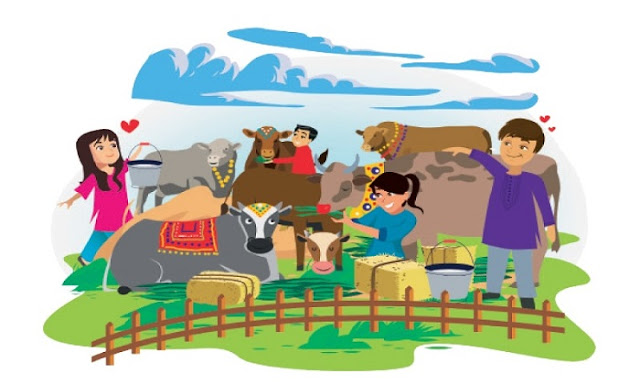Today is Saturday (August 1) the holy Eid-ul-Azha. Feast of Sacrifice. This is one of the major religious festivals of Muslims in Bengali society also known as 'Eid of Sacrifice'. On this day, the devout Muslims of the country will be inspired by the glory of sacrifice and will offer animal sacrifices at the end of Eid prayers to please Allah Almighty.
Muslims around the world sacrifice 10 zilhaj animals. However, there are provisions for animal sacrifice in 11th and 12th districts. But due to the ongoing coronavirus infection and floods, the joy of Eid has faded a lot.
To prevent coronavirus infection, the government has banned Eid Jamaat ceremonies at Eidgah grounds or open spaces. As a result, everyone has to perform Eid prayers in the mosques of the country following the hygiene rules. No hugs or handshakes with anyone at the end of prayers.
In Islam, Eid al-Adha is associated with Ibrahim (peace be upon him) and his son Ishmael (peace be upon him). Abraham (peace be upon him) was commanded in a dream to go and sacrifice his son Ishmael to Allah. This command from God was a test for Abraham. He passed the test with all the preparation to slaughter his son at the command of Allah.
It is narrated that when he finished slaughtering his son Ishmael with his own eyes closed, he opened his eyes and saw that instead of Ishmael, an animal was sacrificed, which came from Allah.
In keeping with the memory of that incident, the provision of sacrifice through the slaughter of animals as an obligation of Ibrahim (AS) has come in the Islamic Shari'ah. According to that, animal sacrifice is obligatory for every able-bodied Muslim.
In the morning, the worshipers will perform the obligatory prayers of two rak'ats of Eid-ul-Azha in the nearest mosque following the hygiene rules. Khatib will highlight the meaning of sacrifice in the sermon of prayers.
আজ শনিাবার (১ আগস্ট) পবিত্র ঈদ-উল আযহা। ত্যাগের উৎসব। বাঙালি সমাজে ‘কোরবানির ঈদ’ নামেও পরিচিত মুসলমানদের এই অন্যতম প্রধান ধর্মীয় উৎসব। এদিন দেশের ধর্মপ্রাণ মুসলিমরা ত্যাগের মহিমায় উদ্বুদ্ধ হয়ে ঈদের নামাজ শেষে মহান আল্লাহর সন্তুষ্টি আদায়ে পশু কোরবানি দেবেন।
বিশ্বের মুসলিমরা ১০ জিলহজ পশু কোরবানি করে থাকেন। তবে ১১ ও ১২ জিলহজও পশু কোরবানি করার বিধান রয়েছে। কিন্তু চলমান করোনাভাইরাসের সংক্রমণ ও বন্যার কারণে ঈদ আনন্দ অনেকটাই ম্লান।
করোনাভাইরাস সংক্রমণ ঠেকাতে এবার ঈদগাহ মাঠ বা উন্মুক্ত স্থানে ঈদের জামাত অনুষ্ঠানে নিষেধাজ্ঞা দিয়েছে সরকার। ফলে দেশের মসজিদগুলোতেই স্বাস্থ্যবিধি মেনে সবাইকে ঈদের নামাজ পড়তে হবে। নামাজ শেষে কারও সঙ্গে কোলাকুলি বা হাত মেলানো যাবে না।
ইসলামী ধর্মমতে, ঈদুল আজহা ইব্রাহিম (আ.) ও তার পুত্র ইসমাইল (আ.)-এর সঙ্গে সম্পর্কিত। ইব্রাহিম (আ.) স্বপ্নে আদিষ্ট হয়ে পুত্র ইসমাইলকে আল্লাহর উদ্দেশে কোরবানি করতে গিয়েছিলেন। আল্লাহর পক্ষ থেকে এই আদেশ ছিল ইব্রাহিমের জন্য পরীক্ষা। তিনি পুত্রকে আল্লাহর নির্দেশে জবাই করার সব প্রস্তুতি নিয়ে সেই পরীক্ষায় উত্তীর্ণ।
বর্ণিত আছে, নিজের চোখ বেঁধে পুত্র ইসমাইলকে বেঁধে যখন জবাই সম্পন্ন করেন, তখন চোখ খুলে দেখেন ইসমাইলের পরিবর্তে পশু কোরবানি হয়েছে, যা এসেছিল আল্লাহর পক্ষ থেকে।
সেই ঘটনার স্মৃতি ধারণ করেই ইব্রাহিম (আ.)-এর ওয়াজিব হিসেবে পশু জবাইয়ের মধ্য দিয়ে কোরবানির বিধান এসেছে ইসলামি শরিয়তে। সেই মোতাবেক প্রত্যেক সামর্থ্যবান মুসলমানের জন্য পশু কোরবানি করা ওয়াজিব।
সকালে মুসল্লিরা নিকটস্থ মসজিদে স্বাস্থ্যবিধি মেনে ঈদুল আজহার দুই রাকাত ওয়াজিব নামাজ আদায় করবেন। খতিব নামাজের খুতবায় তুলে ধরবেন কোরবানির তাৎপর্য।
Muslims around the world sacrifice 10 zilhaj animals. However, there are provisions for animal sacrifice in 11th and 12th districts. But due to the ongoing coronavirus infection and floods, the joy of Eid has faded a lot.
To prevent coronavirus infection, the government has banned Eid Jamaat ceremonies at Eidgah grounds or open spaces. As a result, everyone has to perform Eid prayers in the mosques of the country following the hygiene rules. No hugs or handshakes with anyone at the end of prayers.
It is narrated that when he finished slaughtering his son Ishmael with his own eyes closed, he opened his eyes and saw that instead of Ishmael, an animal was sacrificed, which came from Allah.
In keeping with the memory of that incident, the provision of sacrifice through the slaughter of animals as an obligation of Ibrahim (AS) has come in the Islamic Shari'ah. According to that, animal sacrifice is obligatory for every able-bodied Muslim.
In the morning, the worshipers will perform the obligatory prayers of two rak'ats of Eid-ul-Azha in the nearest mosque following the hygiene rules. Khatib will highlight the meaning of sacrifice in the sermon of prayers.
আজ শনিাবার (১ আগস্ট) পবিত্র ঈদ-উল আযহা। ত্যাগের উৎসব। বাঙালি সমাজে ‘কোরবানির ঈদ’ নামেও পরিচিত মুসলমানদের এই অন্যতম প্রধান ধর্মীয় উৎসব। এদিন দেশের ধর্মপ্রাণ মুসলিমরা ত্যাগের মহিমায় উদ্বুদ্ধ হয়ে ঈদের নামাজ শেষে মহান আল্লাহর সন্তুষ্টি আদায়ে পশু কোরবানি দেবেন।
বিশ্বের মুসলিমরা ১০ জিলহজ পশু কোরবানি করে থাকেন। তবে ১১ ও ১২ জিলহজও পশু কোরবানি করার বিধান রয়েছে। কিন্তু চলমান করোনাভাইরাসের সংক্রমণ ও বন্যার কারণে ঈদ আনন্দ অনেকটাই ম্লান।
করোনাভাইরাস সংক্রমণ ঠেকাতে এবার ঈদগাহ মাঠ বা উন্মুক্ত স্থানে ঈদের জামাত অনুষ্ঠানে নিষেধাজ্ঞা দিয়েছে সরকার। ফলে দেশের মসজিদগুলোতেই স্বাস্থ্যবিধি মেনে সবাইকে ঈদের নামাজ পড়তে হবে। নামাজ শেষে কারও সঙ্গে কোলাকুলি বা হাত মেলানো যাবে না।
বর্ণিত আছে, নিজের চোখ বেঁধে পুত্র ইসমাইলকে বেঁধে যখন জবাই সম্পন্ন করেন, তখন চোখ খুলে দেখেন ইসমাইলের পরিবর্তে পশু কোরবানি হয়েছে, যা এসেছিল আল্লাহর পক্ষ থেকে।
সেই ঘটনার স্মৃতি ধারণ করেই ইব্রাহিম (আ.)-এর ওয়াজিব হিসেবে পশু জবাইয়ের মধ্য দিয়ে কোরবানির বিধান এসেছে ইসলামি শরিয়তে। সেই মোতাবেক প্রত্যেক সামর্থ্যবান মুসলমানের জন্য পশু কোরবানি করা ওয়াজিব।
সকালে মুসল্লিরা নিকটস্থ মসজিদে স্বাস্থ্যবিধি মেনে ঈদুল আজহার দুই রাকাত ওয়াজিব নামাজ আদায় করবেন। খতিব নামাজের খুতবায় তুলে ধরবেন কোরবানির তাৎপর্য।




